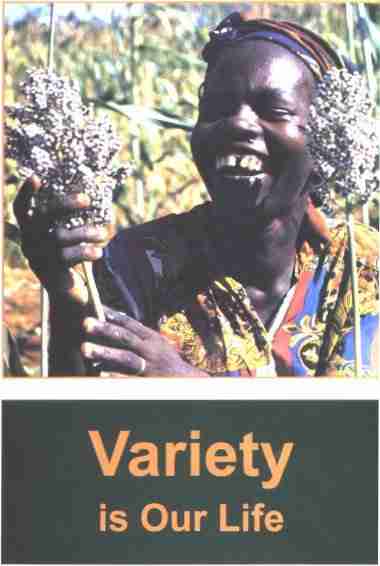|
|
|
| Industrialised Countries Blocking Tactics Late Monday night (22 May), Africa Group delegates proposed many changes to
the Agicultural Biodiversity Decision in favour of farmers, local markets and
local food systems, sustaining functions of agro-ecosystems to provide for food
production and food security, and proposed a ban on GURTs. Few of their words
remained and in the case of GURTs discussion was stifled. These issues were
brought back to the full Working Group but to no avail. Despite there being a majority of countries whose food production is dominated by smallholder farmers, pastoralists and fisherfolk, the minority of countries with mainly industrial agriculture but with the biggest purses and loudest voices in the Contact Group, dominate and block language that defends the interests of farmers and sustains the functions of local agro-ecosystems... and they prevent a ban on Terminator Technologies Example of a process by the COP for eroding commitments to positive actions that would directly support smallholder farmers and sustainable use of agricultural biodiversity.
GBF 15 Recommendation to COP 5 from the Agricultural Biodiversity workshop The Parties to the Convention should support actions to raise consumer awareness to support sustainable farming, agricultural biodiversity and localised food systems in all ecosystems particularly in drylands. By the promotion of improved markets, which add value locally, consumers can increase the transfer of resources to producers: e.g. support for niche markets, organic farming; increased access to national and international markets. The COP should recognise and facilitate this.
Africa Group proposed the above text in the Agricultural Biodiversity Contact Group and then modified this with the help of the European Union to text along the lines of... The Parties to the Convention should support actions to raise consumer awareness to support sustainable farming, agricultural biodiversity and localised food systems with improved markets, which add value locally and increase access to national and international markets.
Highlighted text was deleted by a joint attack from Argentina and Australia, because "such proposals could possibly be construed as trade-distorting". Even the modified phrase ", and markets which add value locally." placed at the end of the text below, was deleted by a raised eyebrow of the Australian delegate staring hard at the Polish Chair, Elzbieta Martyniuk, despite support from nearly everyone else including the African countries, the EU, Slovenia for the CEE, Brazil and observing NGOs.
Final text in Agricultural Biodiversity Decision V/9 "10. Invites Parties, Governments and relevant organizations to support actions to raise public awareness in support of sustainable farming and food production systems that maintain agricultural biodiversity;"
The US (non-Party) delegate said afterwards in private, that those were "only changes to text"…we all know what the intention is but written words mean different things to different people… ¿ Que?
During the Agricultural Biodiversity discussions, warning notices appeared on columns at COP 5 on 18 May, as a result of Breaking News from the BBC about the genetic pollution of more than 11,000 acres (later revised upwards by a factor of 10 or 20)
Further evidence of environmental negligence by Industrialised countries? Or was it deliberate deception by pro-biotech seed companies? What difference would 'Strict Liability' make? Call for a Global Moratorium on international movement and trade in GMOs "… The mountain of cynicism proved to be too heavy for Cartagena in 1999 but the pressure of Africa and the majority of the South in the Seattle conference rooms and the move for a fairer deal in the streets of Seattle started winds that unleashed their erosive force. By Montreal, less than two months later the erosion made the mountain scalable and now the Cartagena Protocol of Montreal is in Nairobi. … It makes sense that while we await the coming into force of the Cartagena Protocol we have a global moratorium on the transboundary movement of GMOs. … I would invite everyone to work for a fairer and much safer world, one that won't enjoy mountains of wealth separated by huge depressions of poverty…. We need a fairer world." Tewolde Berhan Debre Egziabher, Director, Environmental Protection Agency, government of Ethiopia; and spokesperson for the Africa Group Speaking on behalf of the African Group in the closing Plenary of COP 5. |
